
Early boats: A person in a boat (Barramiya, Upper Egypt, ca. 4000 BC)
Early boats: When did people invent boats?
African sailing has a long history. People were probably using boats before the first people left Africa. At Blombos Cave in South Africa, people were fishing about 70,000 BC.
African science and inventions
History of fishing
All our Africa articles
By the time people got to Southeast Asia about 40,000 BC they certainly had early boats. Some archaeologists think even Neanderthal people used boats!
Early primates
When did people invent sails for their boats?
The earliest pictures of African boats are from about 4000 BC, when they appear in Egyptian rock carvings. Probably some of these early African boats had sails – at least, their neighbors in the Arabian peninsula already did. The boats may have been made of bundles of papyrus reeds. That’s how people built some early West Asian ships and Californian Native boats, because wood was too expensive.
Early West Asian ships
Californian Natives
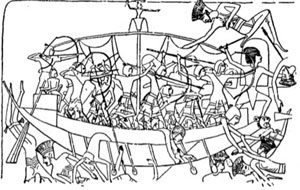
Early boats: Brailed sails on Sea People’s ships (Medinet Habu, ca. 1200 BC)
Brailing the sail
As early as the Old Kingdom, though, Egyptians were importing cedar wood from Phoenicia (Lebanon) to build big wooden ships that could sail on the Mediterranean and in the Red Sea. By 1200 BC, if not before, Egyptian sailors used brailing – bunching up the sail with ropes – as a quick way to use less sail when wind conditions changed.
Did Phoenicians sail around Africa?
But as Egypt got poorer, the center of African sailing shifted further west to Carthage. Many Phoenicians had colonized Carthage around 800 BC. Phoenicians were devoted sailors, and they brought their ships and knowledge of ship-building with them to Carthage.
Around 600 BC, according to Herodotus, the Pharaoh of Egypt sent a Phoenician fleet of ships to sail around Africa. It’s possible that they really did it, starting down the coast of East Africa and returning up the Atlantic coast. During the 400s BC, Carthaginian expeditions down the Atlantic coast of Africa may also have reached as far south as Cameroon. (That’s about halfway down the coast.)
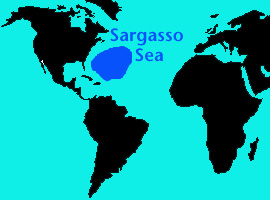
Sargasso Sea
Did Himilco explore the Atlantic Ocean?
Himilco the Navigator, a Carthaginian man who lived during the 400s BC, explored the Atlantic coast of Europe as far north as northern France, probably looking for tin to use in making bronze.
Himilco reported finding lots of dangerous seaweed, too. Where was that? He may have sailed as far west as the Sargasso Sea. That’s part of the Atlantic Ocean that’s full of seaweed – and almost to the Caribbean!
Eudoxus creates trade routes to India
About 130 BC the Ptolemies in Egypt sent out an explorer named Eudoxus who figured out how to use the monsoon winds to sail to India, greatly expanding African trade with India and making East Africa much richer. Eudoxus then tried twice to sail around Africa down the Atlantic coast, but failed. (Probably he died trying.)
Ancient Indian economy
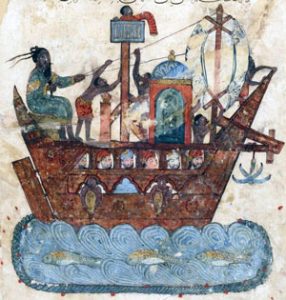
Abu Zayd sailing (inside the boat looking out) Maqamat of al-Hariri Bibliothèque nationale de France, manuscript Arabe 5847, Folio 119 Verso: maqama 39.
Ethiopians conquer Yemen
In 335 AD, Ethiopian ships carried Aksumite soldiers over to Yemen. They conquered Yemen, which was a very rich country, and occupied it. Medieval Ethiopian traders reached Iran, India, Sri Lanka, and as far as Malaysia.
Tanzanian port of Kilwa
Then about 1000 AD, Iranian traders colonized the port of Kilwa. After that, Kilwa’s ships also carried African traders and conquerors all over the Indian Ocean and the Persian Gulf. But, like Indian ships, African ships used square sails, not the lateen sails of the Mediterranean Sea.
Learn by doing: go out on a sailboat
Sailing in West Asia
Bibliography and further reading about ships and sailing in ancient Africa:


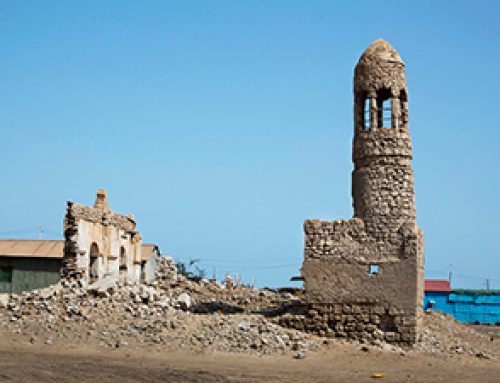
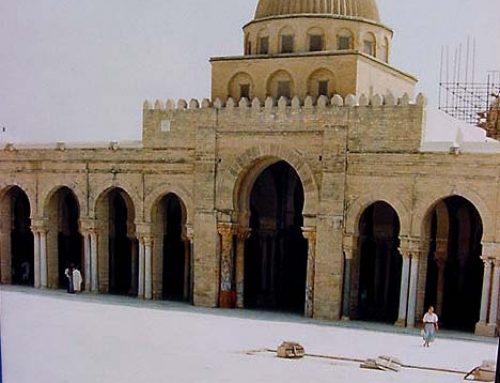
Why didn’t sub saharan africa build boats and explore the east coast of Africa and beyond?
[…] Car, K. E. (2017). Ships and sailing in ancient Africa – early boats. Quatr.us Study Guides. Retrieved from https://quatr.us/africa/ships-sailing-ancient-africa-early-boats.htm […]
thanks for the help
You’re welcome, Joe! Glad we could help. If ducksters.com would like to link to us, that would help us out a lot, so more students could use this site.